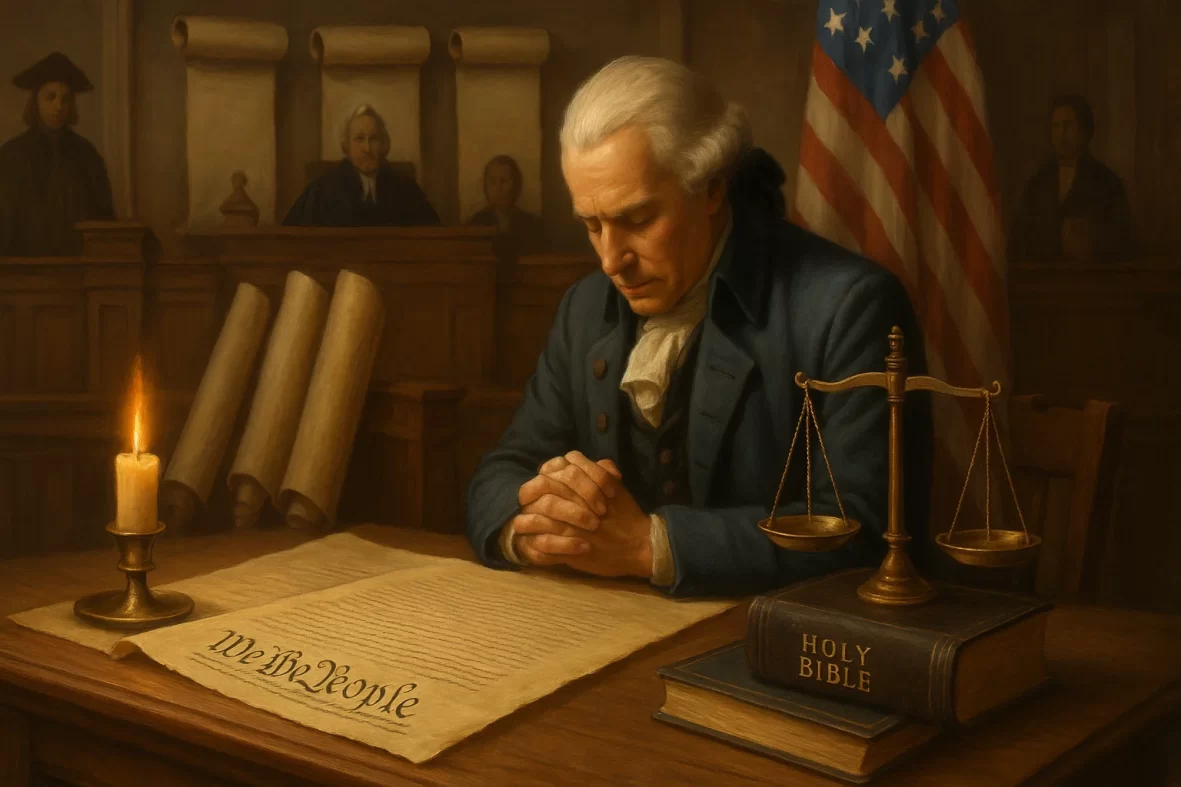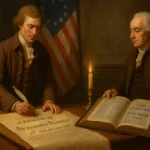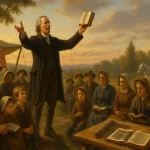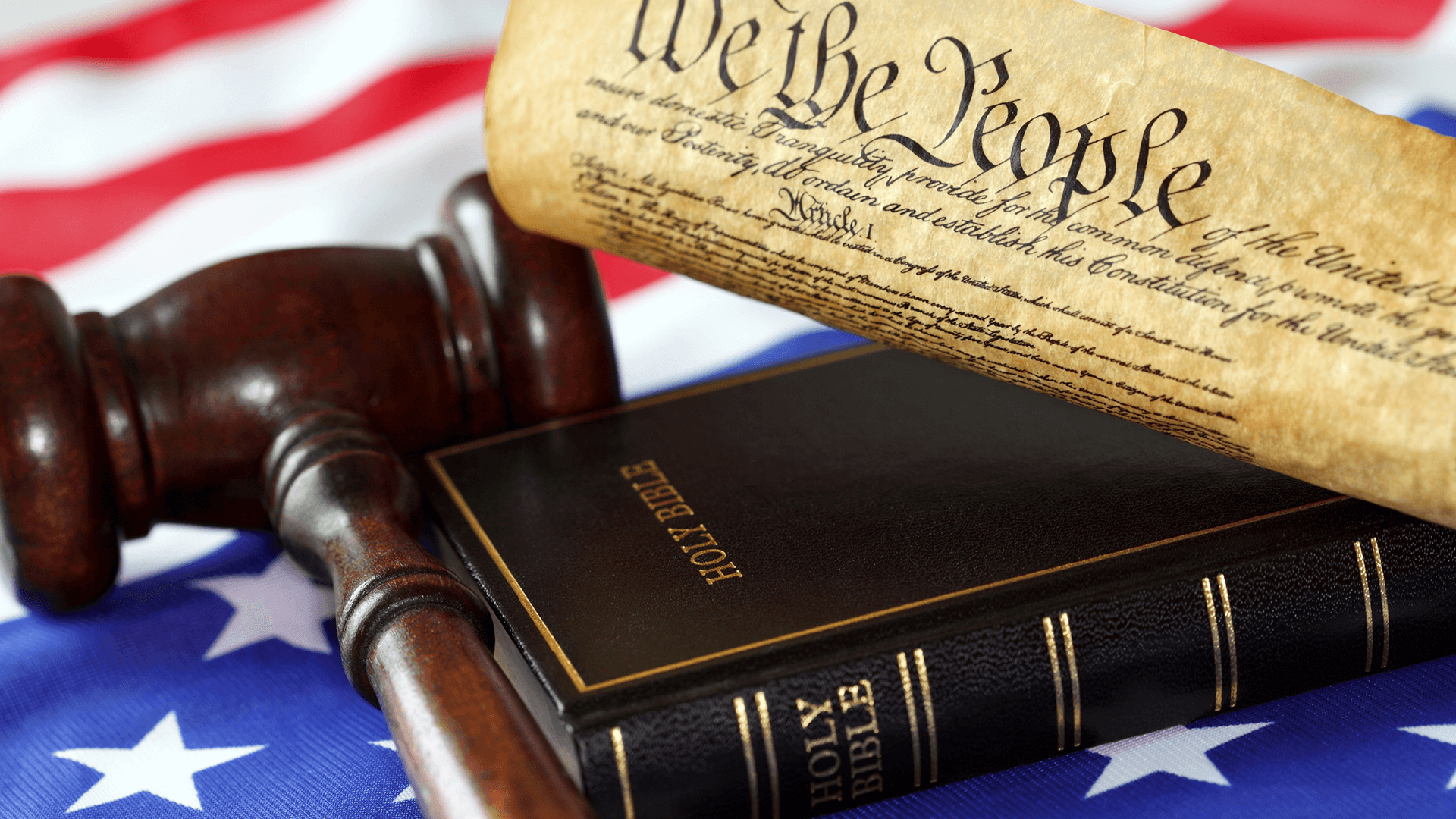Part 6 of Civic Theology: How the Bible Shaped America’s Founding and Freedom
The Secular Script and Its Sacred Foundations
On its face, the U.S. Constitution makes no religious claim. It begins with “We the People” and even bars any “religious Test” for office (U.S. Const. art. VI). Yet the framers never treated law as a mere human artifact. They assumed a higher moral order. As the Apostle Paul taught, “there is no authority except from God” (Rom. 13:1), implying that even a secular charter depends on divine sanction. Indeed, the Declaration of Independence locates human rights in “the Laws of Nature and of Nature’s God” (Jefferson, 1776), signaling a natural-law worldview. The Constitution, therefore, implicitly rests on an unwritten covenant of virtue. Notably, the Constitutional Convention opened and closed with prayer, reflecting the delegates’ belief that without God’s guidance their political “building” could collapse like Babel. In short, while the text is secular, its soul is shaped by a biblical understanding of justice and fallenness.
Virtue, Reason, and the Founders’ Vision
The framers embraced Enlightenment ideals, but they also recognized human sinfulness. James Madison observed in Federalist No. 51 that “if men were angels, no government would be necessary” (Madison, 1788). Likewise, John Adams warned in 1798 that “we have no Government…capable of contending with human passions unbridled by…morality and religion” (Adams, 1798). In their thinking, a republic could flourish only among virtuous people. Indeed, John Adams wrote in Massachusetts’s first constitution (1780) that “the happiness of a people and the good order and preservation of civil government depend on piety, religion, and morality” (Adams, 1780). George Washington echoed this wisdom in his 1796 Farewell Address, declaring that “of all the dispositions and habits which lead to political prosperity, religion and morality are indispensable supports” (Washington, 1796). The Framers thus assumed that liberty without virtue was a house built on sand. They prized reason, but never divorced it from a biblical realism about the heart.
Separation of Powers: A Divine Design
The Constitution’s tripartite structure owes much to biblical precedents. When Moses grew weary of judging Israel alone, his father-in-law Jethro urged him to appoint judges over thousands, hundreds, fifties, and tens (Exod. 18:21–22), spreading the burden of leadership. Likewise, God’s own law set limits on earthly rulers: Deuteronomy 17:18–20 commands every king to write out and read God’s law daily, ensuring he remains subject to higher standards. The Framers absorbed these lessons. At Philadelphia they divided power among legislative, executive, and judicial branches, ensuring that no single person or faction could seize total control – a structural safeguard drawn from both reason and revelation. In practice, Congress makes the laws, the President executes them, and the courts interpret them. Thus the Founders mirrored Scripture’s insight that God’s authority is one thing, but human governments must check each other’s power.
Checks and Balances: Wisdom from Scripture
The Framers routinely echoed Scripture when explaining why no branch should rule alone. Recall Proverbs 11:14: “Where there is no guidance, a people falls, but in an abundance of counselors there is safety.” This ancient proverb resonates with the Federalist argument that governance needs many voices and veto points. No branch stands entirely alone; each has oversight or veto over the others. Even Jesus drew a lesson about limits on force. When Peter drew his sword to defend Him, Christ calmly rebuked him: “Put your sword back; for all who take the sword will perish by the sword” (Matt. 26:52). In other words, even a rightful cause does not justify unchecked power. The Framers took this to heart: the President cannot unilaterally declare law beyond Congress, nor can Congress ignore the judiciary. In these ways, they wove Scripture’s counsel into the very fabric of the Republic. They built a government that trusted neither saintly virtue nor human wickedness alone, but a divinely designed system of accountability.
- Separation of Powers: Exod. 18:21–22; Deut. 17:18–20.
- Checks and Balances: Prov. 11:14; Matt. 26:52.
- Rule of Law: Rom. 13:1–4; 1 Pet. 2:13–17.
- Virtuous Citizenry: Adams (1798); Washington (1796).
The Rule of Law and God’s Justice
The Framers viewed the rule of law as an extension of God’s justice on earth. Scripture portrays law not as a tyrant’s whim but as a reflection of God’s character. Judges must be impartial, not bribed or swayed (Deut. 1:17). Paul taught that magistrates “do not bear the sword in vain; they are God’s servants, agents of wrath to bring punishment on the wrongdoer” (Rom. 13:4). In other words, legitimate government punishes evil as if God Himself demanded it. The Constitution embodies this principle. It vests judicial power in courts, not in individuals: judges swear oaths to uphold written law, not personal fancy. The President and members of Congress likewise swear an oath “to support this Constitution,” often adding the words “so help me God.” These solemn pledges, echoing biblical covenant language, reflect the Founders’ belief that governance is accountable to divine justice (Rom. 13:1). Even the Supremacy Clause (Art. VI) frames federal law as the nation’s highest “pursuant to this Constitution,” implying that officials are bound to a higher charter. In early state constitutions, invoking God was common. For example, Pennsylvania’s 1776 charter opened under “the omnipresence of God Almighty” (Bonomi, 1986), and many required public oaths to God. All of this underscores that the Framers assumed law must comport with moral law or lose its authority (1 Pet. 2:13–17).
Enlightenment Rationalism Meets Biblical Realism
It is true that the Framers admired Enlightenment thinkers—Locke, Montesquieu, and Bacon shaped their vocabulary of “natural rights” and limited government. But they did not elevate reason above revelation. They knew from experience and Scripture that people are not angels. One can almost imagine a Founders’ debate in Philadelphia: Thomas Jefferson extolling the power of reason, while John Adams interjects a Galatians quote—“God is not mocked” (Gal. 6:7)—to warn against naiveté. James Wilson might note that even Roman law, praised by Enlightenment philosophers, was grounded in the Ten Commandments long before. Madison could quip, “Gentlemen, ambivalence toward Providence in governance will not keep our republic afloat.” In such a lively give-and-take, scripture tempered Enlightenment optimism. As a historian notes, the Founders regularly balanced progress with piety (Eidsmoe, 2007), and documentary records show natural-law arguments alongside biblical allusions (Lutz, 1987). The point was clear: reason can outline government’s shape, but only faith and virtue give it substance. They crafted an ingenious system, not expecting men to be perfect, but trusting in a system that works because men are not perfect.
Covenantal Freedom Under God
Ultimately, the framers conceived the Constitution as part of a covenant under God, not a morally neutral contract. They envisioned America as a new promised land bound to high duties. In drafting Massachusetts’s Constitution of 1780, John Adams insisted that government success depended on “piety, religion, and morality” (Adams, 1780). Decades later he declared plainly, “Our Constitution was made only for a moral and religious people. It is wholly inadequate to the government of any other” (Adams, 1798). George Washington echoed the theme by repeatedly invoking Divine Providence; in his Farewell Address he affirmed that religion and morality were “indispensable supports” of the republic (Washington, 1796). The Framers even took Scripture’s words about authority seriously: Jesus taught us to “render to Caesar the things that are Caesar’s, and to God the things that are God’s” (Matt. 22:21), and Peter urged believers to submit “for the Lord’s sake” to human authorities (1 Pet. 2:13–17). The Constitution reflects these dual duties. It lays out citizens’ obligations to obey just laws (Caesar) while ultimately acknowledging a higher lawgiver.
Today those insights remain a solemn reminder. If civil rulers “do not bear the sword in vain” (Rom. 13:4), then governments lose legitimacy when they act wickedly. The American experiment thrives only when its people honor the moral law that inspired the Founders. As Proverbs teaches, “Righteousness exalts a nation, but sin is a reproach to any people” (Prov. 14:34). The U.S. Constitution is a superb framework—but without a virtuous citizenry it cannot stand. As Charles Spurgeon might say, a man building his house upon the rock of divine law will stand firm, but one building on sand will not (Matt. 7:24–27). In that spirit, the Constitution can continue to serve as “that fundamental char[t]er of human happiness”—provided we remember it was meant to rest on virtue under God.
References
Adams, J. (1780). Massachusetts Constitution of 1780.
Adams, J. (1798, October 11). Letter to the Officers of the 1st Brigade of the 3rd Division of the Massachusetts Militia. Founders Online, National Archives.
Bonomi, P. U. (1986). A Factious People: Politics and Religion in Early National America. Oxford University Press.
Eidsmoe, J. R. (2007). Christianity and the Constitution: The Faith of Our Founding Fathers. Thomas Nelson.
Jefferson, T. (1776). The Declaration of Independence.
Jefferson, T. (1802, January 1). Letter to the Danbury Baptist Association.
Lutz, D. S. (1987). The Origins of the American Constitution: A Documentary History. University Press of Kansas.
Madison, J. (1788). Federalist No. 51.
Washington, G. (1796, September 19). Farewell Address.
Want to explore further?
Dig Deeper into Civic Theology








